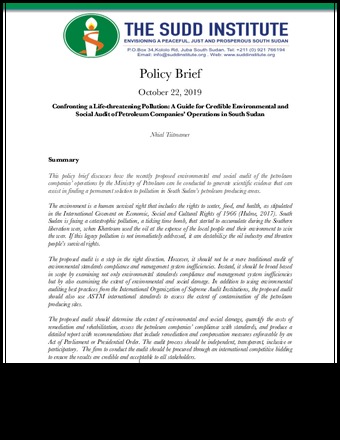Confronting a Life-threatening Pollution: A Guide for Credible Environmental and Social Audit of Petroleum Companies’ Operations in South Sudan
Publication Summary
This policy brief discusses how the recently proposed environmental and social audit of the petroleum companies’ operations by the Ministry of Petroleum can be conducted to generate scientific evidence that can assist in finding a permanent solution to pollution in South Sudan’s petroleum producing areas.
The environment is a human survival right that includes the rights to water, food, and health, as stipulated in the International Covenant on Economic, Social and Cultural Rights of 1966 (Hulme, 2017). South Sudan is facing a catastrophic pollution, a ticking time bomb, that started to accumulate during the Southern liberation war, when Khartoum used the oil at the expense of the local people and their environment to win the war. If this legacy pollution is not immediately addressed, it can destabilize the oil industry and threaten people’s survival rights.
The proposed audit is a step in the right direction. However, it should not be a mere traditional audit of environmental standards compliance and management system inefficiencies. Instead, it should be broad based in scope by examining not only environmental standards compliance and management system inefficiencies but by also examining the extent of environmental and social damage. In addition to using environmental auditing best practices from the International Organization of Supreme Audit Institutions, the proposed audit should also use ASTM international standards to assess the extent of contamination of the petroleum producing sites.
The proposed audit should determine the extent of environmental and social damage, quantify the costs of remediation and rehabilitation, assess the petroleum companies’ compliance with standards, and produce a detailed report with recommendations that include remediation and compensation measures enforceable by an Act of Parliament or Presidential Order. The audit process should be independent, transparent, inclusive or participatory. The firm to conduct the audit should be procured through an international competitive bidding to ensure the results are credible and acceptable to all stakeholders.
Nhial Tiitmamer has served as the Director of the Environment and Natural Resources Program at The Sudd Institute where he is currently on leave to work with United Nations in South Sudan (UNMISS). He has served as an Adjunct Assistant Professor at the University of Juba where he has taught Environmental Economics, Natural Resources Economics and Environmental Sociology. Between November 2021 and November 2022, Nhial worked as Senior Environment Associate with the United Nations High Commissioner for Refugees (UNHCR) in Juba. Before returning from Canada in 2013, Nhial worked at Arletta Environmental Consulting in Calgary and at University of Alberta’s Augustana Campus in Camrose in Alberta, Canada. Nhial’s research focusses on natural resources governance, environmental protection, climate change, and sustainable energy. He was awarded in May 2023 by the Board of Directors of The Sudd Institute with Research Impact Award for policy impacts. Nhial holds a B.A. in Environmental Studies with a minor in English Literature from the University of Alberta and an M.Sc. in Sustainable Energy Development from the University of Calgary in Alberta, Canada.

